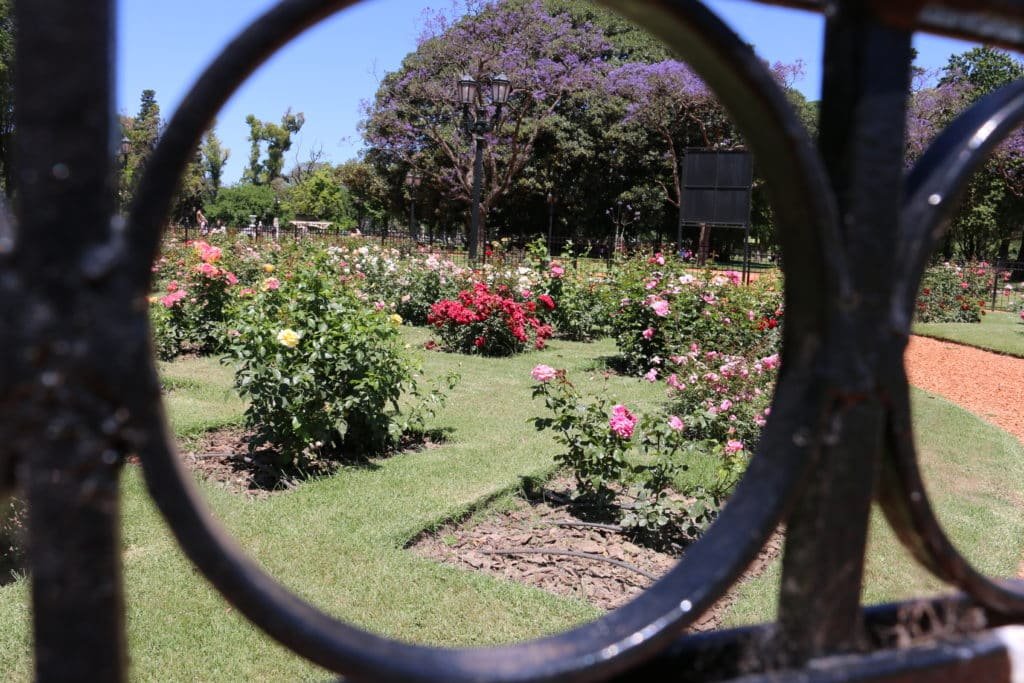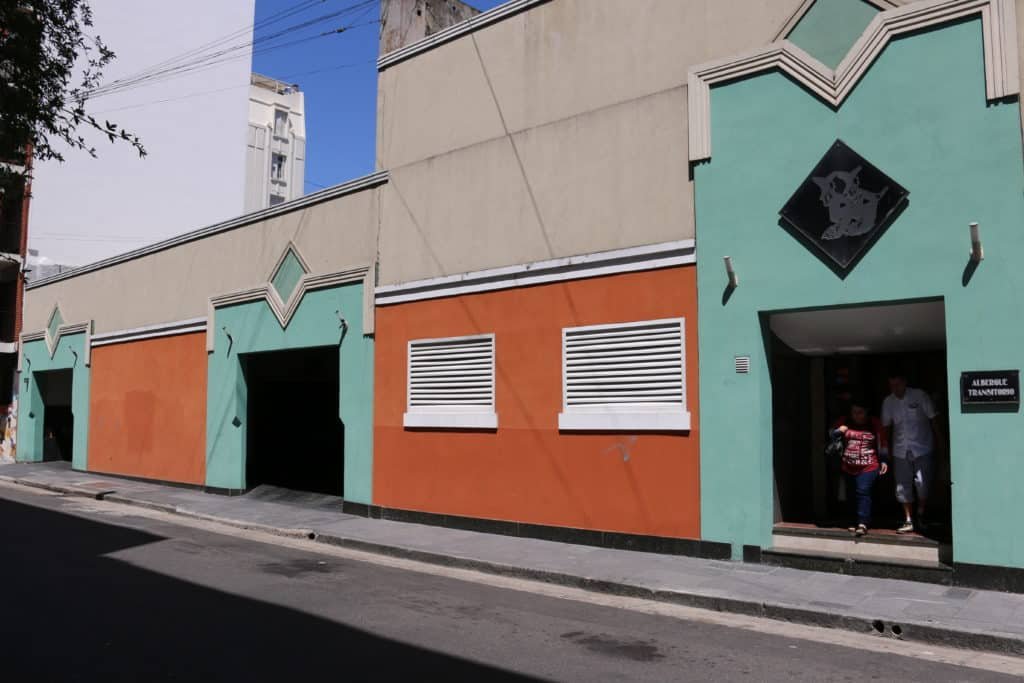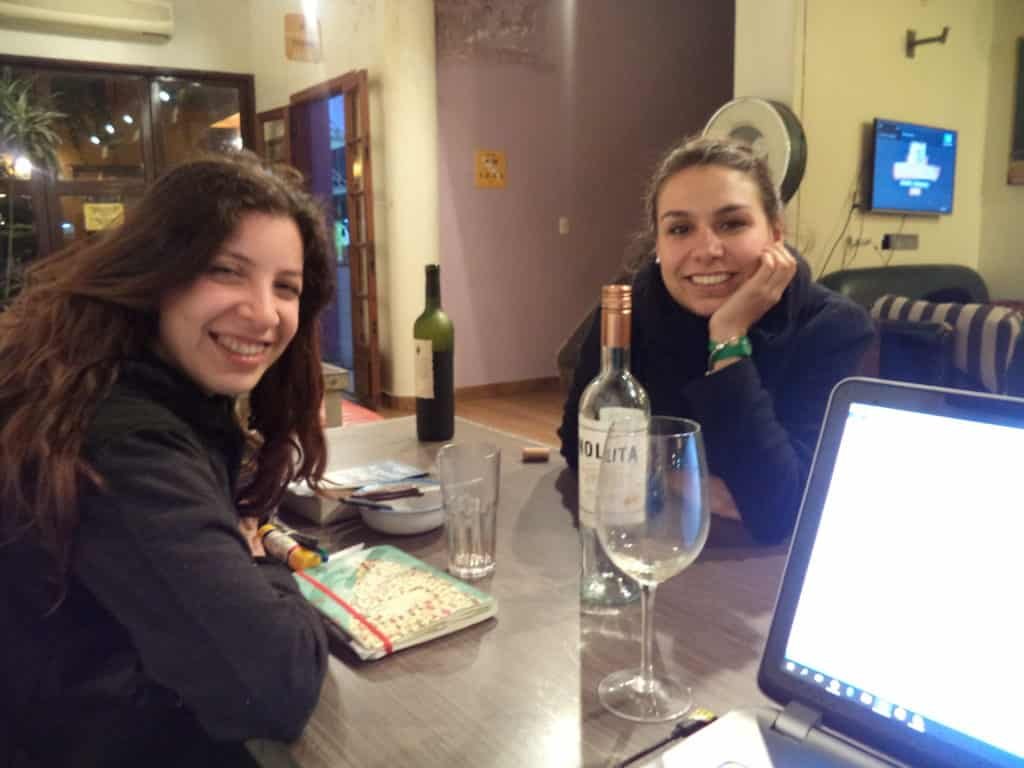by John Bechtel | Jan 7, 2017 | Argentina, Buenos Aires, Economics, Extended travel

Incredibly, this is the Buenos Aires home of their water department. Built in 1894, it contains offices, some large water tanks, and a toilet museum. The country that commissioned this palace to house their water utility over a century ago today can’t deliver or track the delivery of even a hearing aid, the bureaucratic quagmire is so dense.
On a recent Friday, Puerto Limon Hostel where I reside in Buenos Aires got a phone call asking if I was a resident there. They asked for my passport number and said they had received a small package addressed to me from the U.S. The package contained a replacement hearing aid from the Audibel hearing aid organization in Florida. As part of my warranty on their product, they had agreed to replace the hearing aid I had lost, and put on the bill of lading a value of $2 because zero was not acceptable. The following Monday, a Fed Ex driver stopped by the Hostel, not to deliver the package, but to drop off two pages of confusing instructions, in Spanish, about how to pay customs charges of U.S. $121 and an additional AR $250 for my free package. I had heard horror stories about package delivery in Argentina, but being the eternal optimist, I was ready to find out for myself. I do not visit a country to become its critic, and after five months of residence here, I loved Buenos Aires and learned more every day. I even entertained notions of using this experience to deepen my understanding of how customs worked, and how the values were determined.
So I set about with one of the receptionists here, who tried to translate the written instructions. Eventually she gave up and called the local Fed Ex office. They explained what I would owe, which I thought was ridiculous. After all, a comparable hearing aid was simply not available in Argentina, and why would they punish a handicapped person (not being able to hear IS a handicap) by making a replacement as difficult and as expensive as possible? It’s not as if they could repair or replace it from an Argentine provider. The following is what happened next to me and Erika, my assistant and interpreter, who was helping me on her precious day off work:
(more…)
by John Bechtel | Dec 25, 2016 | Argentina, Buenos Aires, Entrepreneurship

Estefania Gulina, first time Executive Producer, from Cordoba, Argentina
Some live lives of unfulfilled promise; lives that could have been, but that didn’t happen. Sometimes because the individuals are too dull-witted to even conceive of their own possibilities, overwhelmed and paralyzed by too many possibilities, too risk averse to take a chance, or lacking the industry and persistence to pursue their dreams with focus and stamina. None of this describes Estefania Gulina, a 32-year-old first-time Executive Producer of a movie to be filmed in Cordoba, Argentina, and a recent guest at Puerto Limon Hostel here in Buenos Aires. Her motto is “The way traveled was not wasted time if it has really been lived.”
Estefania is passionate about everything she does; she has little tolerance for a monochromatic existence, and if she is going to do something, she will hold back nothing as if subconsciously preparing for failure. She says her broad interests and passion for making things happen are the reason she has gotten involved and stayed with projects for years. But she is no fool either.
(more…)
by John Bechtel | Dec 20, 2016 | Argentina, Buenos Aires, Puerto Limon Hostel, South America

From the left: John Bechtel, freelance travel and culture writer; Joshua Kelsey, scholar, linguist, backpacker; William Morgan, medical science researcher. They are waiting for Rick Powell, the chef of Puerto Limón Hostel, to make his appearance after preparing Lenguado Ceviche.
Puerto Limón Hostel, Buenos Aires
I have often been asked why I continue to live in Puerto Limón Hostel here in the San Telmo barrio of Buenos Aires. There are many travelers here who have far more experience than I do with hostel life in many countries. There are 50 beds in this hostel, and other than Rick Powell, an American from Indiana who has been here for eight years, I now have the most seniority. I have become a long-term guest and I have remained here because it serves my purposes for coming to Argentina in the first place.
In the last five months I have met people from 39 countries from right here in the Community Room of Puerto Limón Hostel. This hostel has a cozy feeling to it, a touch of Tuscany, let’s say. It’s air conditioned, very clean, and well organized. But I could get all of that and more in a hotel, albeit at a higher price. What I could not get in an apartment, a home, or even a popular bar, is the opportunity to meet and engage with all these people. I find this very soul-satisfying. Relatively speaking, there are few Americans who come through here. But just last week I met the exception, the very exceptional William Morgan, a retired medical science researcher at the university level, whose specialty was malaria.
(more…)
by John Bechtel | Nov 24, 2016 | Buenos Aires, Freelance Writer, Puerto Limon Hostel, South America

The traveler
For this particular Thanksgiving Day, we will leave the worries of the world at the door and travel themeless, timeless, but not thoughtless. Here are thoughts, sights, sounds, smells, and springtime pleasures from travelers at the Puerto Limon Hostel in Buenos Aires.
The Traveler: The traveler has no safety net. At home the familiar and unchanging serve as a safety net. But the traveler needs to be in the zone, and in the flow. Otherwise he can get lost with no one to help him. He can’t bother with worry or fear. So he allows for everything and can know nothing for sure, trusting that in the end things will be as they need to be.

This is a recently published article I wrote about how the Finns stole the tango from Argentina and rebranded it to their own culture. Click on the picture to read the entire article.

Rose garden and jacaranda trees in November
In the springtime, the mind turns to love, and in Buenos Aires business picks up for the transitorios. Lunfardo, or Buenos Aires slang popular in the neighborhoods where the tango also began, had a special word for where lovers met. One characteristic of lunfardo is that it reverses the order of syllables, so that hotel becomes tel-ho. But in Spanish, the “h” is silent, so telho is pronounced as telo. On the street a telo is lunfardo slang for a transitorio, one of which is directly across the street from Puerto Limon Hostel where I have stayed for the last four months.
So what is a transitorio? It is a place where you can rent rooms by the hour in order to have sex—but it is not a whorehouse. Far from it.

A Buenos Aires “telo” or transitorio, where you can have privacy, discretion, and imagination for a reasonable price.
The lodging is provided, but not the partner.
(more…)
by John Bechtel | Nov 4, 2016 | Argentina, Buenos Aires, Puerto Limon Hostel, San Telmo

Enya (composer and lead band vocalist from Chile) and Ana (agricultural commodities specialist from Mexico) making their futures happen.
The Petri dish at Puerto Limon Hostel
This hostel of Puerto Limon is a Petri dish in which generations of humanity pass in compressed form; it is a reduction sauce that intensifies the scents and flavors of global cultures, colliding, embracing, arguing, dealing with lost loves and chasing new sensations–all in a mad, chaotic rush to imaginary finish lines: the end of a vacation, a flight from frustrations, boredom, or responsibility, or an endlessly delayed dodge of the need to return to productive life, or possibly to engage with it for the first time. The hostel is a place where you can hide from your enemies, your friends, from life, or from yourself (in the latter case, particularly is this so if you don’t like yourself, or are afraid to find out more.) The hostel is a place where you can stumble across answers to questions you were afraid to ask. Some recent specimens observed in this amazing laboratory have been:
The Vacationers
The majority of guests here are vacationers, usually from other parts of South America. These usually come in groups, sometimes just couples, and there is a lot of laughter and happy talking. They experience mild sorrow that their stay is ending, but they have roots to go back to, homes, traditions, extended families, and familiar cultures. They put in big days of sightseeing here, and go out some nights, because Buenos Aires is a city of the night. But the vacationers tend to come back a little earlier, perhaps between midnight and 2 a.m. The next day it begins all over again, and time is not to be wasted.
The Refugees
Then there are the refugees, usually from Venezuela, a country that is such a mess it makes Cuba look forward-thinking. When a guest at Puerto Limon says they are from Venezuela, you don’t have to ask if they are on vacation, or when they are planning on going “home”. They aren’t. Many of them are professionals, well educated, ambitious, and speak much better English than most Argentinians. Maybe that is because the upper middle class of Venezuala (from a time when there was a middle class at all) are the only few with enough resources left to flee the country and make their way south. The others are literally starving and millions protest in their streets. Complete lawlessness and anarchy cannot be far behind.
(more…)
by John Bechtel | Sep 16, 2016 | Argentina, Buenos Aires, San Telmo

Santana, from Dresden, Germany, has nine years of formal training in ballet and is here for the travel adventure, to improve her Spanish, and master the Tango.
In a recent conversation with one of the female residents of Puerto Limon Hostel (not Santana pictured here) in which she was discussing various men in her life, she used the expression “un hombre completo” enthusiastically describing one of them. When I picked up on the interesting expression and asked for more details, she provided the following, but since a great deal of her answer was peppered with lively and animated facial and body language, I will fill in some of the blanks with my own words, not hers. Hopefully I will accurately convey the essence of what she shared with me.,
Apparently the expression is unique to Mexico and not necessarily the entire Latin American population, and originally was applied to bulls and horses as the essence of maleness: powerful and inspiring of both awe and respect. When the bull comes out of the gate at a bullfight, with his lethal horns, rippling and powerful shoulders, back, and hind legs, he is the personification of fight, attitude and yes, danger. As a collective the crowd sucks in their breath in anticipation of the impending confrontation between the bull and the mounted matador and horse with their own combined advantages of agility, speed, and cunning.
When “completo” is applied to a man, it is about the whole man, particularly as perceived by his female counterparts. It is about first impressions, a grand entrance that commands respect, the way he moves, his self-confidence, his touch, powerful but gentle; he is relaxed and elegant. He is beautiful to the eye, whether in a $5,000 designer suit or in jeans and
(more…)









Recent Comments